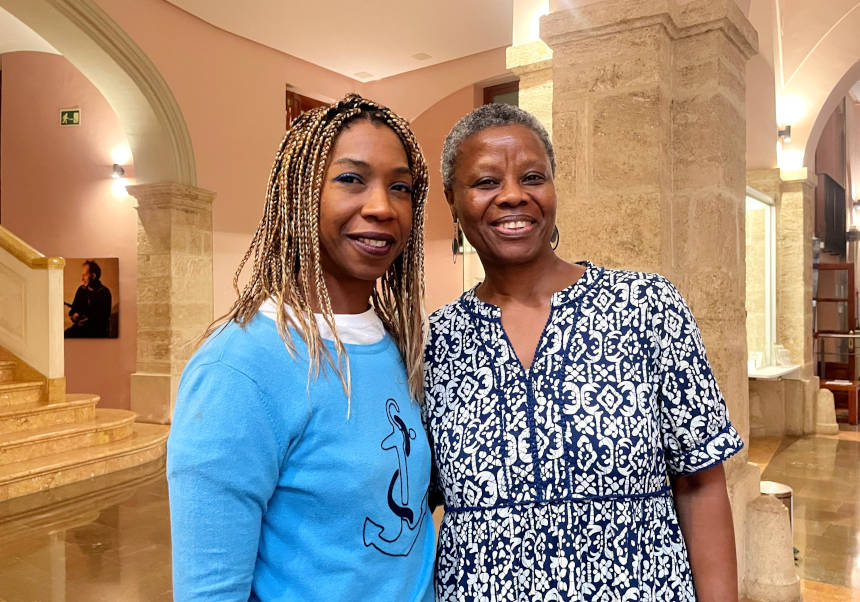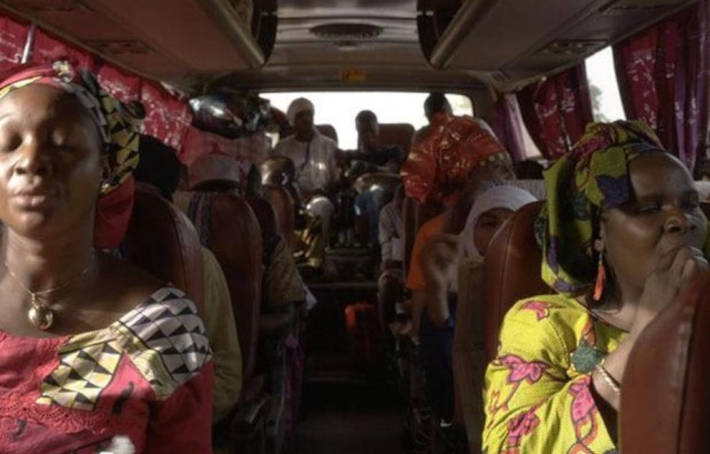
“A homage to the strength, the resistance and solidarity of African women facing adversity”. This way the UV Cinema Club defines the first of the commemorative acts organised for the International Day of Women and Afro-descendant Girls (25 July) and the International Day of the African Woman (DIMA) (31 July) that has taken the Universitat de València on Thursday, 24, with the projection in the Rector Peset Hall of Residence of the film ‘Frontières’ (2017) by the filmmaker 'burkinabé' Apolline Traoré.
Under the epigraph ‘Mujeres y Cine’, the film session has started after the intervention of the delegate of the Union Institute of Development Aid in the Valencian Community and the general Vice-Manager of occupational health, environment and UGT cooperation, Marisa Baena, along with the professor of Audiovisual Communication of the Universitat de València Patricia Picazo. We are talking about an organised activity by the UV Cinema Club, the UV Rector Peset Hall of Residence, Sindicalistas sin Fronteras ISCOD UGT and the collaboration of CIM Burkina.
The projection of ‘Frontières’, narrates the travel of four women from different countries of Occidental Africa and the obstacles that they find trespassing the frontiers inside the continent itself until reaching their destiny in Mali. It has served as key introduction for the posterior colloquium that, moderated by the professor Patricia Picazo, has been produced between Ángela Nzambi, writer and Equatorial Guinean activist, in representation of the African women established outside the continent, and the Valencian actress and filmmaker Beatriz Mbula, afro-descendant woman dedicated to the audiovisual media and born in the “white world”.
Mbula moved out to Madrid to accomplish her dream of being an actress and developing herself in the cinematographic universe her perspective “in front of the clichés or stereotypes assigned to non-white bodies”, she states.
Meaning, from a “white look”. And how is that “look”? “Colonial, patriarchal, racist, that imposes the white supremacy over any other ethnicity and we give it no attention, so the public continues being drenched of a point of view that continues being present through the white bodies”, explains.
This is the main reason for which Beatriz Mbula insists in “breaking the crystal roof” in vigour also in the seventh art and that prevents that racialized people reach posts of professional or creative responsibility, beyond interpretation.
To their judgement, in the audiovisual “there is no self critique and, therefore, there is no intention in repairing this meaning”. Something she has proposed as goal through her work: “I expose my reality, so that I cannot stay in a white narrative only when I write or when I interpret, and I introduce other sensibilities that transcend the imposed norm”, she points out.
Beatriz affirms having “a strong passion for telling stories about black women” since it is her reality and, having recently been a mum, she wished her daughter to have “all type of references in the future”. “I try that in the stories the main character is not always white, for instance. I move inside my profession thinking about what I will leave behind the day of tomorrow”, she acknowledges.
In this aspect, she begins to be more comfortable, as she herself says, “luckily, cinema is increasingly becoming a common tool of sensitisation and social transformation”. And this is addressed by the programmed acts for this week in many places from the city and that have started with the cinema in the University.
Unity is strength
Both collectives have united for the first time in Valencia, because, in words of Beatriz, they want to be “listened more than seen”, rising their voice to deconstruct the dominant look and that way starting from scratch to be able to “look with other eyes”.
They complete the programming workshops for the collective reflection about women and afro-descendant girls, on Friday 25 in Ruzafa Studio (5:30 pm), and the vindication of rights, participation and memory of the African women, on Saturday 26 in the Centre Cultural Ca Revolta (6:00 pm).
As the feminist writer Ángela Nzambi indicates, they are activities that “aim to generate conscience around multiple ways of discrimination that these African and afro-descendant women confront, at the same time as their resistance, contributions and leaderships in the communities are recognised”.
A task that has been taken by the social and cultural entities whose work is to fight “for human rights, anti-racist feminism and the construction of a more fair and inclusive society”.
Nzambi resides in Valencia and works as a volunteering technician and of participation in the Comisión de Ayuda al Refugiado (CEAR), a profession that conciliates with the activist writing for the human rights. She came from Equatorial Guinea and she can take note of the ways of discrimination to which the African woman is confronted: “Many discriminatory exes pierce us -she points out-, such as gender, skin colour, origin and a humble economic status. We are conscious of all of it because we live it ourselves everyday in work, in housing, in health..., with our boys and girls in the educative centres...”.
In the voice of Ángela there is a tone of lament when pronouncing these words, but that changes when remembering that Valencia finally adds up, to the fights started in other cities such as Madrid or Barcelona, reuniting African women and afro-descendants, racialized women, with an institutional reinforcement as well, which gives their expression a light, and despite this contagious, shade of hope to those listening.








